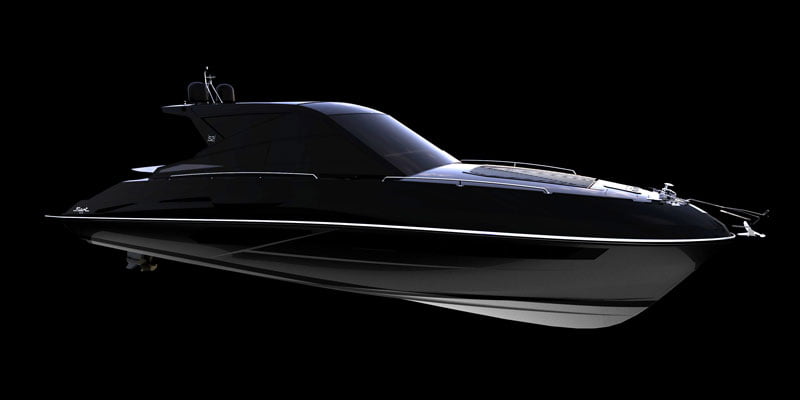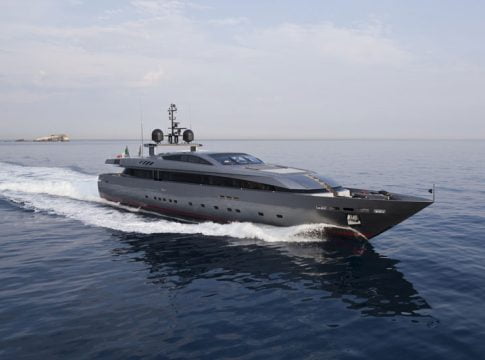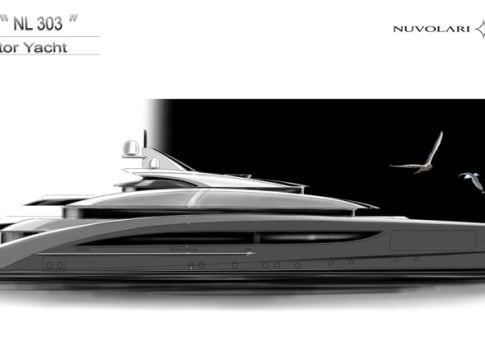Weight, speed, dynamic and static thrust, longitudinal trim angle, wetted surface, running resistance….designing a planing hull to be as fast, efficient, safe and comfortable as possible is a complex task.
To ensure that a craft’s underbody delivers on all the aforementioned fronts, a multitude of closely-interdependent factors have to be taken into consideration. The most meticulous planning has to go into honing and perfecting each and every variable, in fact. There are, of course, mathematical models and bottom types that designers can use as references but at the end of the day, these all have to be calibrated to the specifics of the individual design: waterlines, propulsion type, engine set-up, speed targets all need to be carefully matched.
Designing a hull is a highly skilled, scientifically rigorous task in which there is absolutely no room for improvisation. After almost 60 years in business, the Fiart design office has the knowledge and experience required for just such meticulous approach. Since its foundation, it has always designed the hulls of its boats in-house regardless of whether they were for leisure, military or commercial purposes, and continues to be one of the most high profile engineering yards on the international nautical scene today.
Fiart approaches each new project as absolutely unique with its own story to reveal. All of its boats and thus the hulls have always been built in line with one hard and fast rule: a passion for pushing the technological envelop. Materials and construction systems are constantly changing and evolving as are engines and propulsion types. All and any such modifications must not merely be taken into account in every detail of the design of a boat but used to evolve the details themselves, an approach that lies at the core of the Fiart philosophy.
The new Fiart 52’ both acknowledges and reflects the Neapolitan yard’s sporty, Mediterranean fast cruiser tradition yet is also a brilliant future-forward evolution of it. This is a truly organic, high tech design in which every aspect of the waterlines, structures and plant have been studied synergically and then employed to offer our owners the very best possible end product across the board.
To enter into detail somewhat, the Fiart 52’ hull is longer along the waterline, which enhances the specific characteristics of the IPS transmission supplied as standard with this model. The twin, counter-rotating propellers face forward and work in undisturbed water, boosting their efficiency as does the fact that the the propeller thurst is parallel to the hull. Efficiency improves by up to 35% compared to other conventional propulsion systems and the 1,600 hp unleashed by the Fiart 52’s engines dissipate less energy in powering the boat forward, improving overall performance in terms of fuel consumption also.
Meticulous propulsion system development coupled with precision pinpointing of the fundamental elements involved in designing a new boat – such as weight, position of centre of gravity – are very much part and parcel of the Fiart design approach and guarantee the boat a perfectly centred optimal trim. This allows the waterlines to do their job to the fullest, at a smaller angle to the water surface and, most importantly, more consistently at different speeds. This in turn assures maximum efficiency and an exact correspondence between what the hull promises on paper and the end boat delivers on the water.
Another important technical feature of the waterlines penned by Fiart’s designers is the deep vee in the bow area. Its 27° angle, in fact, helps it slice effortlessly through the waves and ensures improved seakeeping even in moderate swells, especially when heeling is a risk. This pronounced vee at the bow results in better stability at speed and more a precise, eager response to the helm too. In fact, it influences and characterises the overall design of the boat and marks it out as a member of the Fiart range as it has already been adopted on other models produced by the Neapolitan brand.
Sticking with the deep-vee hull, there is a 1deadrise aft to deliver a form that is the optimal compromise pure speed and comfortable seakeeping. These waterlines maximise hydrodynamic support – in other words, they make it easier for the yacht to start and maintain planing at lower speeds even using relatively modest power set-ups. On a practical level, this means the Fiart 52’ planes on fumes – fuel consumption is extremely low and range is significantly extended. That said, at full throttle, the boat quickly reveals the sporty soul inherent in its design, unleashing a performance that makes for an incredibly fun time at the wheel for owner. The Fiart 52’s evolved spec, exceptionally precise handling (via both the classic helm and the joystick Volvo Penta can supply for the IPS) and impressive acceleration up to a very respectable 37 knots guarantee it will prove hugely appealing to an incredibly broad and diverse array of owners.
Technical specifications
Max. length (Lmax) m 16.66
– Hull length (Lh) m 15.70
– Max. beam (Bmax) m 4.42
– Build height m 2.24
– Design draft (no IPS) ~ m 0.780
– Design draft (with IPS) ~ m 1.170
– Aft deadrise 15.50 °
– Midships deadrise 20.70 °
– Length along waterline at full load m 14.05
– Beam along waterline at full load m 3.65
– Trim angle at full load -0.300 °
– Overall height m 4.510
– Design displacement at full load ~Kg.18.000
– Fuel tank ~lt. 1800
– Water tank ~lt. 500
– max. passenger capacity no. 16 – Berths no. 6
– Design category: B
– Engine set-up: Volvo Penta IPS 1050 MD8 EVC DP – 2×800 HP;
(Displacement: 12.8 litres. Weight: 2,920 kg including IPS) – Max. RPM 3000 – Service RPM 80%






